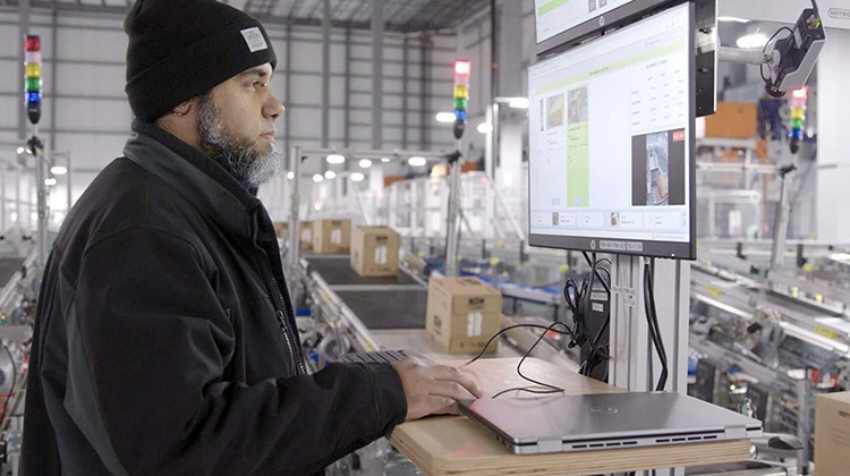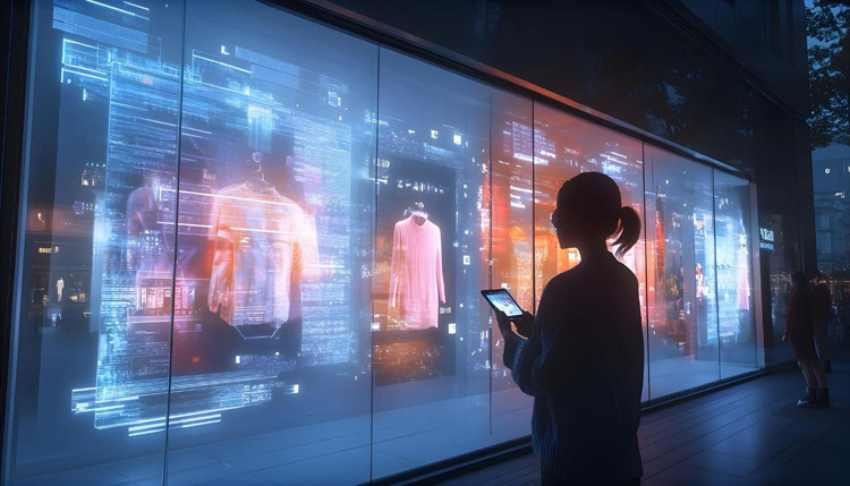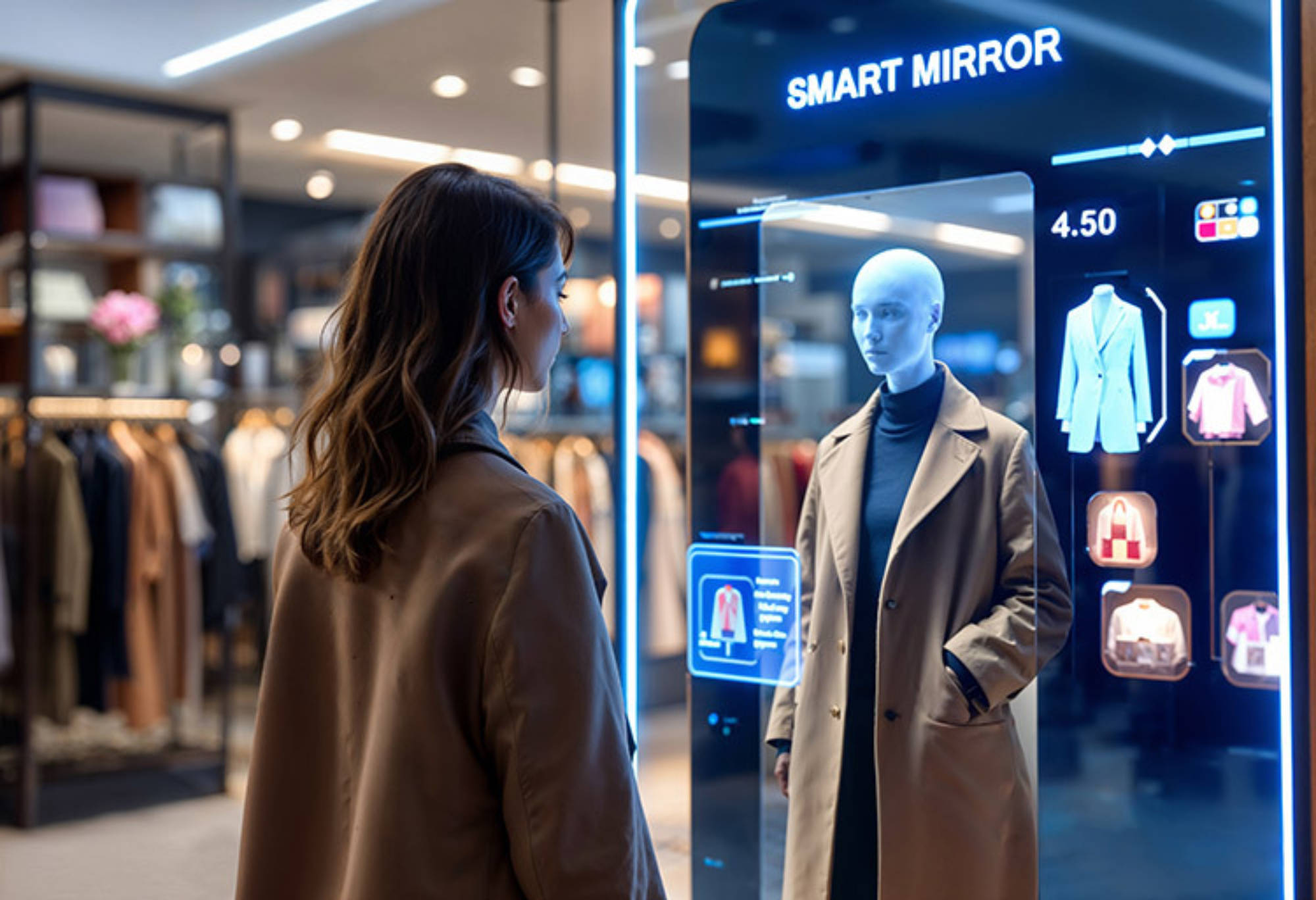AI technology has greatly changed the retail world. They improve the shopping experience, streamline operations, and make businesses more successful. Retailers using artificial intelligence and machine learning technologies performed better than their competitors. Both in 2023 and 2024, retail companies using this kind of technology saw a two-digit growth in their sales compared to the respective previous years. Similarly, their annual profit grew by roughly eight percent, outperforming retailers who did not use AI or ML solutions.
Let’s take a closer look at the AI specifics of retail operations and how they are executed.
AI personalization is improving the way brands communicate with customers. It helps create unique shopping experiences for each client, leading to greater satisfaction and loyalty. For instance, retailers like Amazon use it to analyze customer behavior and suggest products tailored to individual preferences, enhancing the shopping experience and increasing sales.
Similarly, AI-driven dynamic pricing models adjust prices based on demand and competitor pricing. It helps retailers maximize profits while offering consumers better deals.
One of the bright examples of personalization is Abercrombie & Fitch, a 132-year-old retailer that is undergoing a digital transformation.
By leveraging first-party customer data and a loyalty program covering 70%-80% of its customer base, Abercrombie personalizes shopping experiences across digital and physical touchpoints. With nearly 50% of its business being digital, the retailer uses AI for personalized recommendations, demand forecasting, and its innovative AI stylist feature.
Launched last year, the AI stylist allows customers to discover products through conversational prompts, offering deeper insights into customer intent and preferences. This approach not only enhances the shopping journey but continuously improves personalization with every interaction.

Continuing with the topic of online assistants: chatbots and virtual shopping assistants enhance customer service by providing personalized, real-time support.
AI chatbots, handling routine inquiries around the clock, allow human agents to focus on more complex issues. By 2027, chatbots will become the primary customer service channel for roughly a quarter of organizations, according to Gartner, Inc.
Virtual shopping assistants and smart in-store tools have also transformed the way consumers shop, helping them quickly locate products and providing a smoother shopping experience.
Case studies like that of Lowe’s, which has integrated smart robots in its stores, demonstrate how AI-powered tools are being used to guide shoppers to the products they need, improving the overall in-store experience. Similarly, brands like Adidas are using AR and smart fitting rooms to offer customers a more interactive and customized shopping experience, highlighting how these AI-driven tools are reshaping the retail landscape.

Inventory and Supply Chain Optimization
AI in inventory and supply chain optimization changes the way businesses manage their operations by offering intelligent solutions to common challenges. One key feature is automated stock replenishment, which reduces manual errors and saves time. This technology is widely used by major retailers to maintain optimal stock levels, especially during peak seasons, ensuring shelves are never empty while avoiding overstocking.
Another powerful application is demand forecasting, which minimizes surplus and reduces wastage by accurately predicting customer needs. This capability is particularly valuable in fashion retail, where it helps predict fast-moving items and ensures that popular products are always available.
Additionally, AI enables supplier performance analysis, which improves supplier reliability. Electronics retailers utilize this feature to identify and collaborate with the best-performing suppliers, ensuring a seamless supply chain.
As the largest grocery retailer in the US, Walmart is using AI and machine learning to optimize inventory management, predict demand, and improve operations.
Walmart has automated its supply chain, enhancing efficiency and collaboration with human workers.

These advancements have boosted storage capacity and daily order fulfilment at its Pedricktown, New Jersey fulfilment centre. The new system enables Walmart to better manage stock levels, reduce waste, and quickly adapt to consumer trends.
Additionally, automation ensures quality checks, de-palletising, and temperature-controlled storage for incoming cases. Orders are efficiently packed, with fragile items carefully layered, and wrapped pallets are shipped out seamlessly.
The integration of robotics and automation also improves worker conditions while creating around 2,000 new jobs, allowing Walmart to better meet growing demand.
AI-Powered Marketing Strategies
AI is revolutionizing marketing strategies. It automates and optimizes digital marketing efforts, enhances customer loyalty programs, tracks sustainable practices, and communicates them effectively.
In addition, AI is radically transforming the approach to creating art, fashion, and advertising campaigns. A striking example of this is the Mango case.
Mango, a pioneer in the fashion industry, created its first campaign generated entirely using artificial intelligence for the limited-edition Sunset Dream collection of the Mango Teen youth line, now available in 95 markets.
“This initiative reflects our continued commitment to innovation and being on the cutting edge in the fashion world,” says Jordi Alex, Chief Information Technology Officer at Mango. “Artificial intelligence is a technological revolution that presents great opportunities that should act as a co-pilot to extend the capabilities of our employees and further amplify our creativity. Because technology will either make us more human or it won’t,” he adds.

Mango’s campaign involved multiple teams, including design, art, styling, dataset preparation, AI training, and photography. The process began with photographing each garment, followed by training a generative AI model to position the garments on a model. The main challenge was achieving editorial-quality images that preserved garment and model details. Finally, the art team refined and finalized the AI-generated images.
By the way, Mango has developed more than 15 ML platforms (MLE) since 2018 that apply AI at different points of its value chain, such as pricing and personalization, among other areas.

The Great Future and Data Principles
Looking ahead, AI is set to redefine retail even further. From virtual shopping assistants to smart inventory systems, the possibilities are endless. As these technologies evolve, the line between physical and digital shopping will blur, creating seamless experiences that cater to every customer’s unique journey. National Retail Federation today released its Principles for the Use of Artificial Intelligence in the Retail Sector to support the industry’s AI governance and strategic planning.
The principles fall into four high-level categories:
- Governance and Risk Management: developing strong internal governance of AI tools and capabilities as a foundational basis for managing risks.
- Customer Engagement and Trust: retailers should be transparent about their uses of AI.
- Workforce Applications and Use: ongoing oversight of AI applications that may directly impact employees.
- Business Partner Accountability: establishing clear guidelines and expectations for business partners that are providing AI tools.
“Retailers use AI to better serve their customers, improve the shopping experience, and increase the efficiency of their operations,” NRF Vice President of Retail Technology & Cybersecurity and Executive Director of the NRF Center for Digital Risk & Innovation Christian Beckner said. “As retailers of all sizes continue to expand their AI capabilities, these general principles for the use of AI are increasingly critical to the industry.”
These themes and others such as digital transformation, AI-powered personal security, and customer service solutions will take center stage at NRF 2025.
Michael Abramov, CEO of Keymakr, who will attend this event as well, highlighted the pivotal role of data annotation in this transformation. “At Keymakr, we collaborate with retailers to ensure their AI systems are trained with high-quality, precisely labeled data. This includes diverse datasets, from customer behavior patterns to in-store video analytics, enabling accurate predictions and personalized shopping experiences. Importantly, we strictly adhere to all regulations related to data usage and privacy, ensuring compliance with industry standards and fostering trust among our clients and their customers.”
As the retail landscape continues to evolve, the integration of advanced AI systems, supported by ethical and transparent data practices, will be crucial for businesses seeking to stay competitive and deliver value to their customers.


